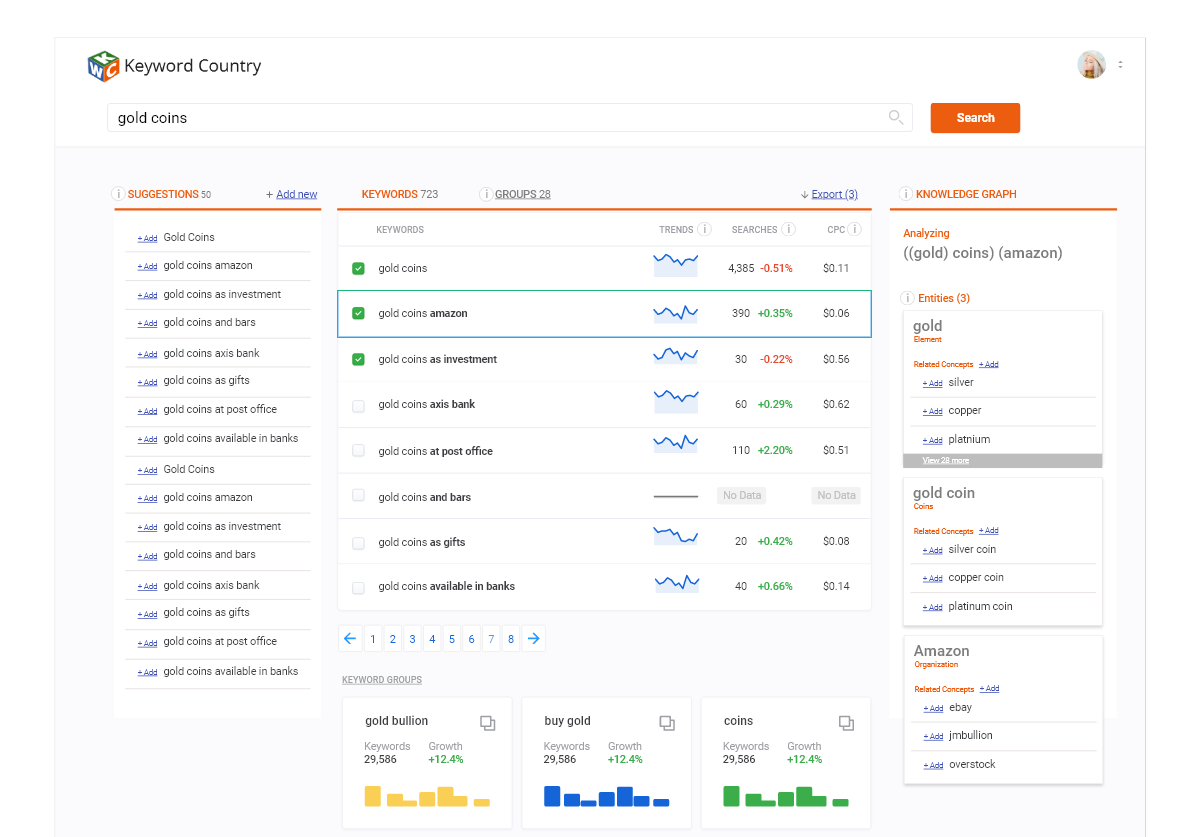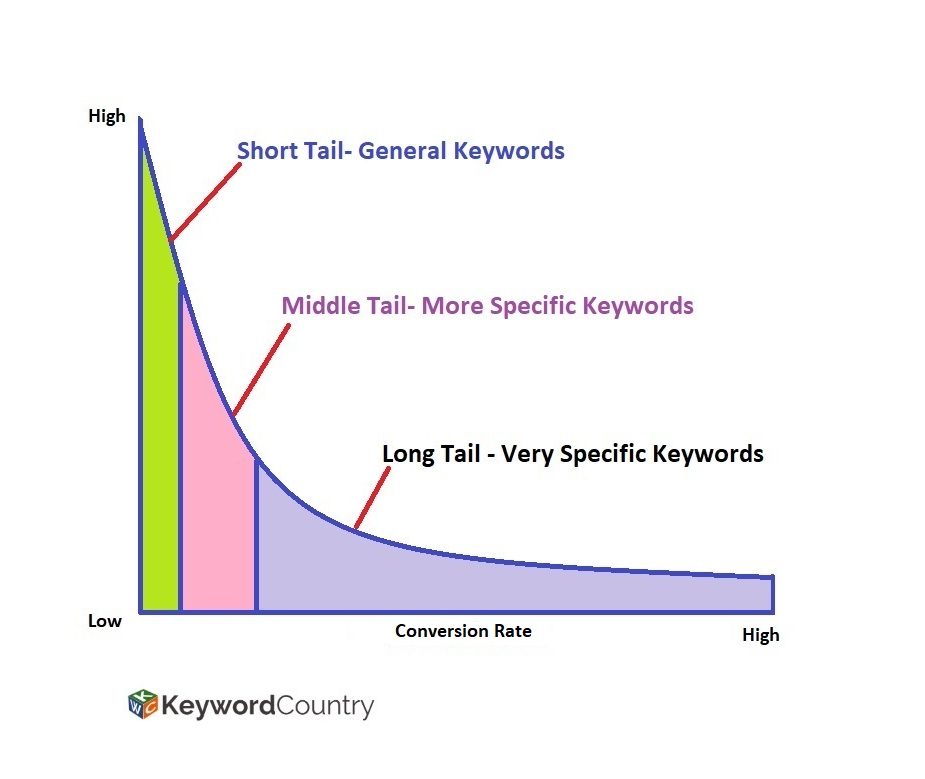Wish to rank higher in the competitive SEO space? If you want to rank for hundreds of low-competition search terms that can drive immense traffic to your website then go for long-tail keywords. They aren’t the most sought-after keywords but they do reflect specific search intent. Incorporating these keywords in your content strategy will give you sustainable organic traffic. Here we explain longtail keywords, its various benefits and how you can find them to include them in your SEO strategy. Let’s begin!
What are long-tail keywords?
Simply put, long-tail keywords are search phrases that have three or more terms in it. While that is the common definition of long tail keywords, they are way more than that. Various keywords are more than 3 words in length but don’t necessarily count as longtail keywords. For instance, “Online reputation management services” has over 1300 monthly searches and its shorter version has 880 monthly searches. This wouldn’t be the case if the keyword was “top online reputation management services for businesses” as it is very specific.
Longtail keywords are keyword phrases that are not that famous and have a low search volume along with high variation. Since these are very specific keywords, they are searched only a few times in the month. These keywords are typed in by individuals who have a very specific query and if your landing page meets their requirement, they will most probably take an action.
Why should you incorporate long-tail keywords?
Let’s say someone searches for “Shoes” on the search engine. How would you know what they are looking for? Are they looking for shoes for women or men? Do they need shoes from a local vendor or are they going to shop online? What color of shoes do they want to buy? You can never find out. But if the same person writes “black shoes online” you would know that the user wants to find shoes that are black in color from an online store. Likewise, “black shoes online for women” would be an example of a long-tail keyword wherein “shoes” is the head or seed keyword.
When a user types in a specific keyword like “black shoes online for women” they know exactly what they want and are more likely going to make a purchase. This is exactly why it is a great idea to include longtail keywords as they attract customers with buying intention and help you convert better. In fact, longtail keywords make up to 70% of all web searches which is a lot! Using these magic keywords in your content can help you get good organic traffic.
Benefits of long-tail keywords
There are various advantages of a long-tail keyword for SEO. Let’s have a look at them.
Lower search volume and hence less competition
When the search volume goes down, the competition automatically reduces. This means that if you use the longtail keywords wisely, you can capitalize on them and improve sales. Moreover, long-tail keywords also have a stronger purchase intent which makes it easier for you to convert. If you haven’t been including this magical keyword in your content, it’s about time you get started.
Easier to rank in the SERPs
What does lower competition mean anyway? Let’s consider an example. If a search keyword “shoes” has 1.5 million search volume then it is certainly a lot of competition. You would have to compete with a lot of brands to rank higher in the search engine results pages (SERP). On the other hand, the keyword “black shoes for women” has 18.1k searches. Thus, competing for the long tail keyword, in this case, is way easier. Therefore, apart from focusing on the high-competition keywords, you can also consider these long-tail keywords that have a targeted intent.
Lower cost to target the longtail keywords
If you are looking for a cost-effective way of improving your search rankings then use longtail keywords. When it comes to organic traffic, you can target a particular long tail keyword for a while and then move on to the next one. Using this method, you will be able to cover a lot of such long-term keywords faster than pouring all your time as well as efforts into a bunch of very competitive keywords. Leverage the trail phrases to get more traffic to your website.
Benefit from higher conversion rates
Long-tail keywords are more specific and hence are more likely to convert. Let’s say that Nike ranks #1 for the keyword “shoes”. So what about people who have specific requirements like a black shoe for women? They would probably click on the website and browse a little, only to move on with their search. On the other hand, someone who types “black shoes for women” knows what she wants and is waiting to browse her options. If your website ranks higher for this query then she will click on the relevant pages and start exploring. It is highly likely that with an instant result like this, she will purchase with your website. This is exactly why you need to build long tail keywords within your content.
Long-tail keywords are how people search in real life
If you wish to rank well on the SERPs you should adapt to the changing user behavior over time. The way people search for your products/services is also constantly evolving. Gone are the days when users had to type in generic terms like “shoes” on Google to get the results they want. Users now trust Google enough to type in a lengthy keyword knowing that they will be mapped with the right result. Nevertheless, voice search has also given a boost to longtail keywords.
How to find long-tail keywords and rank for them?
There are a lot of longtail keyword options that you can choose from. Now to rank well for these, you might have to experiment a little bit! To begin with, analyze your business and figure out what makes it unique or useful. Who is your target audience and what is it that you offer which sets you apart? These aspects can help you reach the searchers who are looking for exactly what you have to offer. For instance, if “designer shoes that are discounted” is your unique selling point then turn it into a longtail keyword.
Tools that you can use to find longtail keywords
If you are looking for an easy way of finding longtail keywords then you can resort to keyword research tools. I have listed the top keyword research tools below.
Keyword Magic Tool
You can type in the keywords and select the country post which SEMrush will give you a list of keywords that can be modified by phrases or related keywords. You also get access to a keyword manager wherein you can save all the keywords you would like to monitor.
KeywordCountry
KeywordCountry is a reliable tool that you can use to scour keywords from over 600,000 industries. You can source longtail keywords along with other data points such as cost-per-click, search volume, and the like. It is the only tool that closely resembles the search engine algorithms to unleash better niches that prevail in your industry. Moreover, you also get access to mass keyword editing and management tools.

Google Ads Keyword Planner
Keyword Planner from Google Ads account helps you discover new keywords and also avail search volume as well as forecasts. Their paid account is a better option than the free account. The tool generates a list of keywords that help you find out the Google Ads competition for every keyword and how much you have to pay for every keyword. Whether or not you are running a keyword campaign, Google Ads keyword planner will help you understand the difficulty level for each keyword.
Final Take
Longtail keywords are the hidden gems of SEO! They are less competitive, packed with purchase intent, and cost-effective. They have an increased conversion rate and ranking for longtail keywords is pretty easy than that for generic search terms. With some research and long-tail keywords tools, one can benefit from the underrated yet effective longtail keywords.
Do you need assistance with searching long tail keywords? Use KeywordCountry to find the best longtail keywords for you and rev up your SEO rankings.







